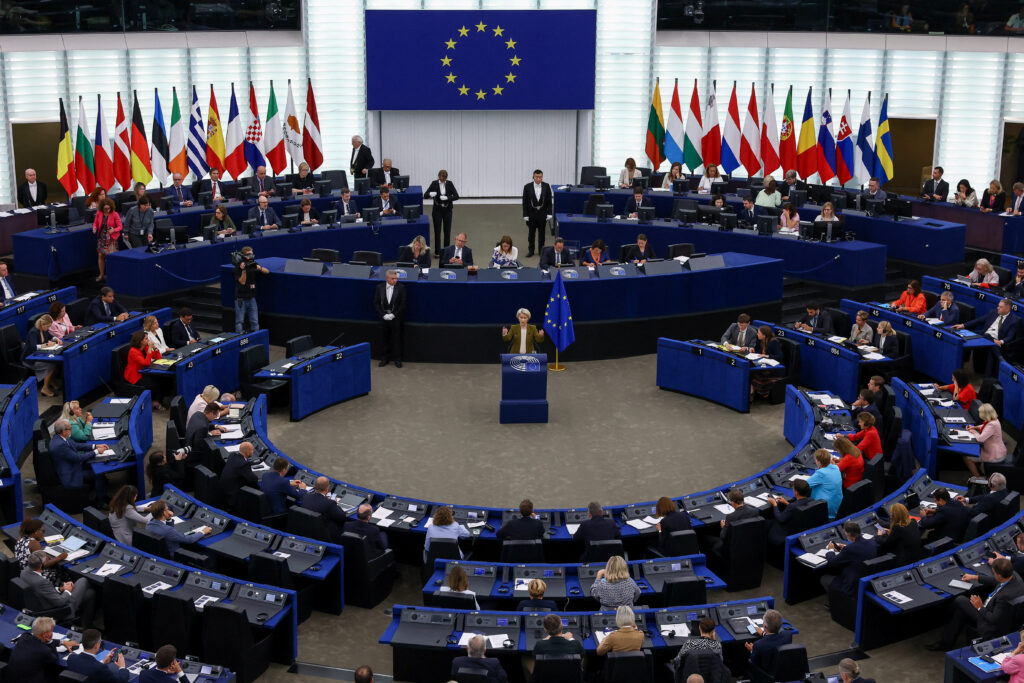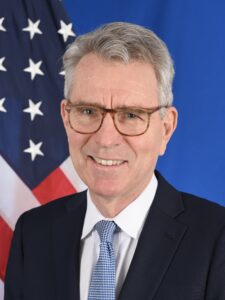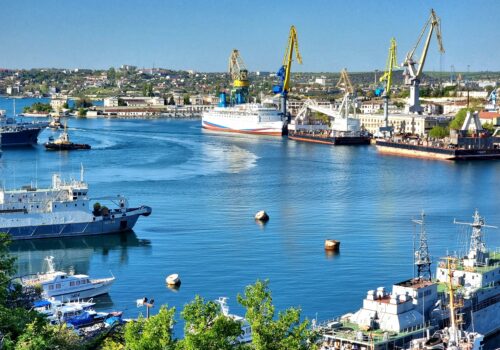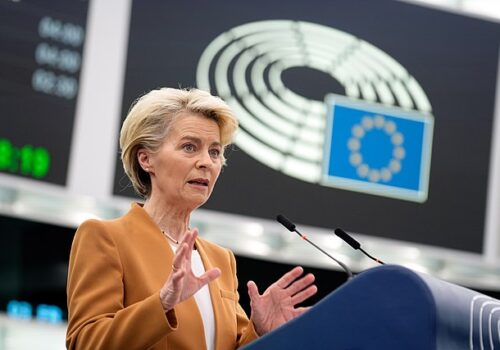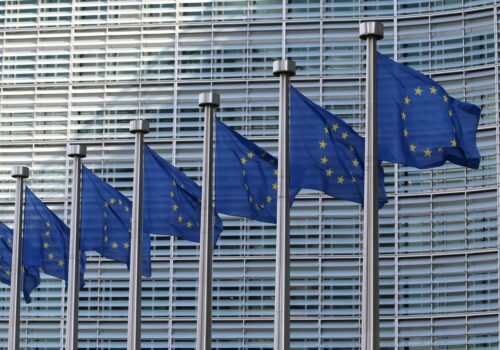European Commission President Ursula von der Leyen’s 2025 State of the Union speech called for Europe to fight for its security and economic prosperity. At the center of this “fight” is reliable, affordable, and resilient energy. The president explicitly tied energy access and security to quality of life, defense capabilities, and geopolitical standing.
Will this speech—aimed to set the political priorities for the year ahead—inspire European nations to align country policies and investments towards a unified energy front? Will they work toward completing energy market and infrastructure integration across borders, forging investment-friendly markets and political certainty? Ordo the competing applause and cackles signal deepening fragmentation in vision and priorities across Europe?
Atlantic Council experts provide their takes:
Click to jump to experts analysis:
Michal Kurtyka: The right message must be followed by real action
András Simonyi: What von der Leyen’s speech did—and did not—say
Andrei Covatariu: Europe’s energy balancing act: nuclear power recognition, softer climate rhetoric
Joseph Webster: Boosting European batteries is a start
Uliana Certan: Europe’s call for greater energy security could be met through the Black Sea region
Lisa Basquel: The road ahead for European energy security
Europe’s ‘independence moment’: a strong signal for continued transatlantic energy cooperation
Reading President Ursula von der Leyen’s State of the Union amid the biggest wave of air strikes since the start of Russia’s full-scale invasion of Ukraine, it’s deeply inspiring to hear her description of Europe’s “independence moment.”
Importantly, she highlights dependence on Russian fossil fuels as a central element of this campaign. This European determination to end Russian energy imports and embrace reliable and much cleaner American LNG represents a success for several decades of transatlantic energy diplomacy.
Also notable is her focus on Europe’s commitment to energy transition, including a 30 percent reduction in emissions by 2030. At a moment when both Europe and the United States are focused on reducing China’s domination of clean energy supply chains, this is an obvious area for continuing transatlantic commercial cooperation. For instance, von der Leyen’s battery booster initiative should build naturally on what the United States has already been doing through the Minerals Security Partnership. Similarly, her strong endorsement of nuclear power as part of Europe’s strategy for energy independence suggests this as a priority focus for American companies working on next-generation nuclear and small modular reactor technologies.
– Geoffrey Pyatt is a distinguished fellow with the Atlantic Council Global Energy Center.
The right message must be followed by real action
European sovereignty. Greater unity. Strategic autonomy. Yes, yes, and yes. These were the key—if recycled—lines adopted by European Commission President Ursula von der Leyen in her “State of the Union” annual speech at the European Parliament yesterday. Europe is encircled and needs to take care of itself—that is the message…again. But will the words be followed with action?
This time, they truly must, as every day brings worrisome proof that the global context is deteriorating. The same morning von der Leyen was delivering her speech, Russian drones for the first time penetrated the European Union—in this case, across the Polish border. Internal social maneuverability and political leadership are worsening across the continent. Also on this 10th of September, French trade unions engaged in a general strike, which coincides with a motion of no-confidence for the François Bayrou government.
And in terms of energy sovereignty, which has become increasingly critical, there has been not much progress but quite a lot of deception. Northvolt, the only European hope to match Asian batteries, has collapsed. The Iberian blackout exposed a major weakness in grid management and, by necessity, led to a ramp up of dispatchable sources. Neither Enrico Letta’s nor Mario Draghi’s report recommendations from 2024 were implemented even though everybody largely agreed with them. The past year only proved once again a hard truth: wishing for different outcomes without imagining different inputs is doomed to fail.
Europe continues to be squeezed between the necessity of importing hydrocarbons and the desire to move forward the energy transition that fuels Asian manufacturing. It now not only depends on Chinese panels and batteries, but also its wind turbines and cars—both electric and conventional. These industries, of which Europeans were once proud, are now subject to a dangerous slowdown. High energy prices and their volatility discourage new investment and harm the profitability of existing industries. If Europe wants to pass from words to action, it needs to develop an independent vision of energy sovereignty and make it an operational issue not only subject to majestic speeches.
– Michal Kurtyka is a distinguished fellow with the Atlantic Council Global Energy Center.
What von der Leyen’s speech did—and did not—say
Von der Leyen’s State of the Union speech was an attempt to appease diverse political audiences, a goal that had her walking a very fine line. It was a wartime speech, which was powerful on the front end, focusing on continued support for Ukraine and surrendering to pressure from the left on Gaza. But the speech became muddled toward the end, as it morphed into a mere checklist and lost track of priorities.
To von der Leyen’s credit, she made an effort to again warn about the challenges Europe faces in an increasingly competitive and hostile global environment, while acknowledging that the Commission has been slow to act.
On energy, her statement that “it’s time to get rid of dirty Russian fossil fuels completely” was a clear rebuke to those who have been advocating a return to cheap Russian oil and gas. Also remarkable was her mention of nuclear as baseload power for more homegrown renewables, breaking with the past Commission consensus that it remain neutral on nuclear energy.
Her strong statement defending the trade agreement with the United States reflects growing criticism of the deal.
The speech, although valiantly delivered, still does not reflect a sense of urgency for Europe, but it does reflect the limits of the power of the Commission president in the face of a very divided Europe. While von der Leyen raised the famous Draghi report, European analyses timed for the speech note that only a small portion of the proposals in the Draghi report has been implemented.
– Andras Simonyi is a nonresident senior fellow with the Atlantic Council Global Energy Center.
Europe’s energy balancing act: nuclear power recognition, softer climate rhetoric
In her State of the Union address, President Ursula von der Leyen struck a notably pragmatic tone, prioritizing Europe’s competitiveness, defense, and strategic autonomy over major new climate announcements.
Transatlantic cooperation remained central to her message. Von der Leyen highlighted the EU-US deal, underlining its importance for protecting European jobs and portraying it as a stronger outcome than what others managed to secure—signaling both the strategic and economic weight of this partnership.
Nuclear power was explicitly acknowledged as part of Europe’s clean energy pathway, reflecting Brussels’ growing openness, influenced by France’s demands for greater recognition in the 2040 climate targets or by the US interest in nuclear projects, particularly in Central and Eastern Europe. Enlargement, too, was emphasized, reaffirming the European future of the Western Balkans, Moldova, and Ukraine—a development that must drive a deeper debate on energy security in these regions.
Notably, “green” and “climate” were mentioned only five times, compared to eighteen mentions in the last State of the Union in 2023, with the 2040 targets briefly referenced amid ongoing heated negotiations in Brussels. Energy affordability, however, remained a central theme of the address.
Despite drawing clear lines between friends and foes, von der Leyen underscored that Europe must remain “open to the world and choose partnerships with allies—old and new,” a statement that may reflect an evolving view of a multipolar global order.
– Andrei Covatariu is a nonresident senior fellow with the Atlantic Council Global Energy Center.
Boosting European batteries is a start
President von der Leyen’s “battery booster package” is a start, but the €1.8 billion for equity to boost production in Europe pales in comparison to over $230 billion in subsidies China lavished on electric vehicles (EVs) and batteries from 2009 to 2023—and even the United States continues to invest tens of billions of dollars in its battery/EV complex despite a less favorable policy environment. Europe risks being left behind in this cutting-edge technology.
It doesn’t have to be this way. Germany’s removal of the debt brake could prioritize battery and EV investment, while other northern European countries enjoy fiscal space that must be balanced against inflation risks. There’s also an urgent need to build on embryonic Europe-US cooperation in advanced batteries.
Finally, advanced batteries hold important security implications for European countries—especially Ukraine. Next-generation, Western-made batteries, with greater energy density, would enable Western forces to outrange Russian drones powered by Chinese batteries. With battery-powered, first-person view (FPV) drones changing battlefield tactics in Ukraine, the EU should prioritize battery investment.
Given batteries’ relevancy for Europe’s military, economic, and climate objectives, the Commission and Member States must build on the battery booster package.
– Joseph Webster is a senior fellow at the Atlantic Council’s Global Energy Center and the Indo-Pacific Security Initiative; he also edits the independent China-Russia Report. This analysis represents his own personal opinion.
Europe’s call for greater energy security could be met through the Black Sea region
Von der Leyen’s urgent call to rewire Europe’s energy map positions the Black Sea region as a key element in reducing dependence on Russian fossil fuels faster and advancing European energy independence. The “Energy Highways” initiative and upcoming Grids Package target persistent gaps in cross-border infrastructure in Central Europe. By prioritizing grid upgrades, new interconnectors, and faster permitting, the Commission signals that Black Sea offshore wind, nuclear capacity, and other clean energy projects can be integrated quickly if they are backed by committed investment and political will.
Von der Leyen’s reference to “crucial stability in our relations with the US” also has implications for regional energy security. Stable EU-US trade relations prevent tariff shocks that could disrupt important infrastructure development. The planned Vertical Gas Corridor would channel US and other non-Russian LNG into the Black Sea region, diversifying essential natural gas routes. In addition, US partnerships on nuclear energy, especially small modular reactors and Cernavodă modernization in Romania, would provide long-term, low-emissions power. These transatlantic links and EU initiatives collectively support the Black Sea’s development into an energy hub that is critical to Europe’s clean energy transition and strategic independence.
– Uliana Certan is a program assistant with AC Romania.
The road ahead for European energy security
Von der Leyen’s emphasis on energy infrastructure in the State of the European Union marks a positive step forward for European energy security and competitiveness. This suggests the Commission is responding to last year’s Draghi report warnings about permitting delays and grid constraints.
However, the slow pace so far in advancing European competitiveness raises doubts about how much this agenda will be acted upon. The Commission’s pledge earlier this year to phase out Russian fossil fuels by 2028 was long overdue, albeit a welcome rhetorical shift. But without proper diversification of energy sources, the EU risks replacing one dependency with another, shifting from Russian gas to increased US liquefied natural gas imports, and ultimately falling short of delivering the strategic autonomy that von der Leyen emphasized throughout her address.
Her call to double down on homegrown renewables, with nuclear as a baseload, and to modernize and invest in infrastructure and interconnectors is a promising step forward. For Central and Eastern Europe in particular, this could further accelerate progress toward meeting the EU’s 2030 climate targets while enhancing long-term energy security. Yet without national buy-in—as seen in Hungary and Slovakia’s resistance to the fossil fuel phase-out, and Austria’s recent legal opposition to nuclear settled by the court this week—these proposals risk becoming at best, slow moving, and at worst, more rhetoric than reality.
– Lisa Basquel is a program assistant with the Atlantic Council Global Energy Center.
‘Made in Europe’ approach will strengthen both EU energy security and its alliance with the US
Europe has learned the hard way that dependency can be weaponized. Ursula von der Leyen’s speech made this point clear by placing competitiveness at the heart of the European agenda. Safeguarding Europe’s economy and future requires urgent action.
From equity support for battery production to ensuring startups can scale with European—not foreign—investments, the State of the Union highlighted long-overdue measures that many in Brussels have been championing for years. If Europe wants to secure industrial leadership, its businesses need to flourish. For this reason, the introduction of Made in Europe criteria in public procurement—although considered controversial by many—should be considered an important tool to create the market signals needed to incentivize investments in domestic strategic clean technologies.
But building a stronger, more independent Europe does not mean building a protectionist one. Europe cannot afford ideology; pragmatism must prevail. The Trump administration forced this reality check upon the bloc.
Under a transatlantic lens, a more competitive Europe is not a US rival but a stronger ally. That should be the spirit guiding the EU and United States as they build on the recently announced trade deal. Von der Leyen is right: It’s not great, but it is the best deal possible, as Europe could not risk a trade war with its most important partner in a moment of deep geopolitical turmoil. Washington should welcome a Europe determined to stand on its own feet, because a resilient, autonomous partner for the United States means a transatlantic alliance capable of driving change together.
– Elena Benaim is a nonresident fellow with the Atlantic Council Global Energy Center
About the authors
more reading
stay connected
Sign up for PowerPlay, the Atlantic Council’s bimonthly newsletter keeping you up to date on all facets of the energy transition:
Our work

The Global Energy Center develops and promotes pragmatic and nonpartisan policy solutions designed to advance global energy security, enhance economic opportunity, and accelerate pathways to net-zero emissions.
Image: European Commission President Ursula von der Leyen delivers the State of the European Union address to the European Parliament, in Strasbourg, France, September 10, 2025. REUTERS/Yves Herman
